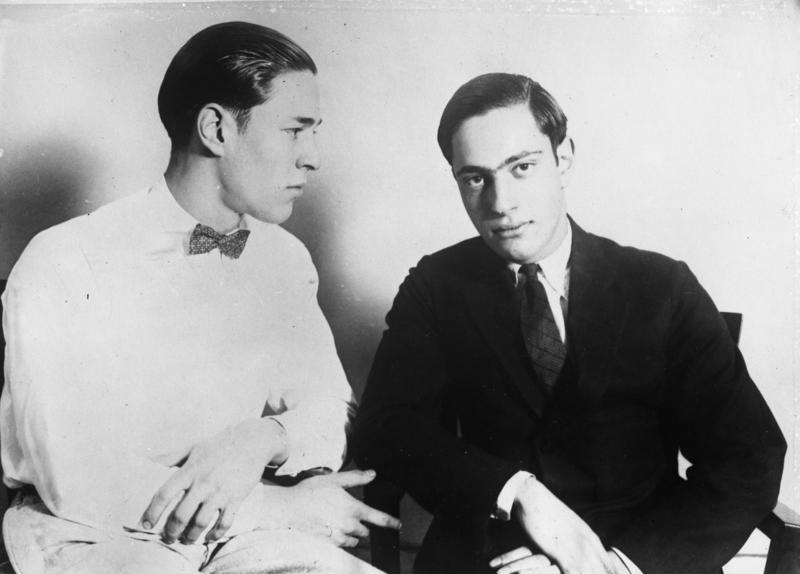
Image Credit: Bundesarchiv, Bild 102-00652 via Wikimedia Commons
By Saul Roth
The Leopold and Loeb murders were a notorious crime that occurred in Chicago in 1924. The perpetrators were two wealthy young men named Nathan Leopold and Richard Loeb, who were both 19 years old at the time of the crime. The two men, who were lifelong friends and classmates at the University of Chicago, had planned and carried out the murder of 14-year-old Bobby Franks in an attempt to commit the “perfect crime.”
Leopold and Loeb were both intelligent and well-educated young men from privileged backgrounds. Leopold was the son of a wealthy Chicago businessman, while Loeb was the son of a wealthy department store owner. Both young men were high-achieving students and had a deep interest in crime and criminal behavior.
On May 21, 1924, Leopold and Loeb abducted Franks as he was walking home from school in Chicago’s South Side. The two men drove Franks to a secluded area, where they killed him and dumped his body in a culvert. The crime was discovered the following day, and a massive manhunt was launched to find the killers.
Leopold and Loeb were eventually arrested and charged with murder. During their trial, they admitted to committing the crime, but claimed that they had done so as a way of demonstrating their intellectual superiority over the rest of society. They argued that they were not motivated by any personal animosity towards Franks, and that they had chosen him at random as their victim.
The trial of Leopold and Loeb was a media sensation, and the two men became known as the “Thrill Killers.” Their defense attorneys, Clarence Darrow and Benjamin Bachrach, argued that the two young men were not criminally responsible for their actions due to their abnormal psychology and mental state. They claimed that Leopold and Loeb were suffering from a condition known as “moral insanity,” which made them unable to understand the difference between right and wrong.
Despite their defense team’s arguments, Leopold and Loeb were found guilty of murder and sentenced to life in prison. They were both sent to the state penitentiary in Joliet, where they remained until their parole in the late 1940s.
While they were in prison, Leopold and Loeb became interested in the field of criminology and began studying the psychological causes of criminal behavior. They both wrote extensively about their own experiences and theories on the subject, and even conducted research with other inmates.
Despite their intellect and education, Leopold and Loeb were never able to completely understand or explain their own motivations for committing such a heinous crime. In their writings, they often tried to rationalize their actions and portray themselves as victims of circumstance or societal pressure.
In the years following their release from prison, both Leopold and Loeb lived relatively quiet and unremarkable lives. Leopold worked as a teacher and a translator, while Loeb tried his hand at several different careers before eventually settling down as a business consultant.
While the Leopold and Loeb murders may have faded from the public consciousness, they remain a fascinating and disturbing example of the dark side of human nature. The two young men’s actions were a stark reminder of the depths to which people can sink when they are driven by greed, arrogance, and a desire for power.
Despite the passage of time, the Leopold and Loeb case continues to be discussed and debated by legal experts, psychologists, and criminologists. Many have argued that the two young men were in fact psychopaths, who were incapable of feeling empathy or remorse for their actions.
Others have pointed to the influence of the “Nietzschean” philosophy that was popular among intellectuals at the time, which emphasized the superiority of the individual over society and the need to overcome moral constraints in order to reach one’s full potential. Leopold and Loeb were both well-versed in this philosophy, and it is possible that it played a role in their decision to commit murder.
Regardless of the reasons behind their actions, Leopold and Loeb’s crimes had a lasting impact on the criminal justice system. Their trial and subsequent imprisonment led to a greater understanding of the concept of “moral insanity,” and sparked a debate about the role of psychology in the courtroom.
The Leopold and Loeb case also brought attention to the issue of capital punishment, and was one of the factors that led to the eventual abolition of the death penalty in Illinois. In the end, the two young men’s lives were forever altered by their decision to commit murder, and their legacy continues to be a reminder of the consequences of violent crime.

Recent Comments